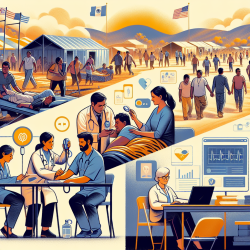Introduction
The economic vulnerability of sexual minorities has long been a topic of concern, and recent research has shed light on how these vulnerabilities have been exacerbated by the COVID-19 pandemic. The study titled "Economic Vulnerability of Sexual Minorities: Evidence from the US Household Pulse Survey" provides valuable insights into the economic challenges faced by lesbian, gay, and bisexual (LGB) individuals. As a practitioner in the field of education or therapy, understanding these challenges can help you better support your students and clients.
Key Findings
The research highlights several critical findings:
- LGB individuals are more likely to experience economic vulnerability compared to their heterosexual counterparts.
- Lesbian and bisexual women, as well as bisexual men, are more likely to report difficulties in paying expenses, food insufficiency, and housing insecurity.
- These vulnerabilities are largely due to pre-existing inequalities that have been exacerbated by the pandemic.
Implications for Practitioners
As a practitioner, these findings can guide you in several ways:
- Awareness and Sensitivity: Be aware of the unique economic challenges faced by LGB individuals. This awareness can help you provide more empathetic and tailored support.
- Advocacy and Support: Advocate for policies and programs that address these economic disparities. Support initiatives that provide financial assistance and resources to LGB individuals.
- Inclusive Practices: Ensure that your practices and policies are inclusive and supportive of sexual minorities. This includes creating a safe and welcoming environment for LGB students and clients.
- Further Research: Encourage further research into the economic vulnerabilities of sexual minorities. Understanding the root causes of these disparities can lead to more effective interventions.
Encouraging Further Research
While the study provides valuable insights, it also highlights the need for further research. Practitioners can play a role in encouraging and supporting research efforts that focus on the economic experiences of sexual minorities. By doing so, we can better understand the mechanisms driving these disparities and develop more effective strategies to address them.
Conclusion
The economic vulnerability of sexual minorities is a complex issue that requires a multifaceted approach. By understanding the findings of this research and implementing inclusive and supportive practices, practitioners can make a significant impact on the lives of LGB individuals. For those interested in delving deeper into the research, the original paper provides a comprehensive analysis of these issues.
To read the original research paper, please follow this link: Economic Vulnerability of Sexual Minorities: Evidence from the US Household Pulse Survey.










